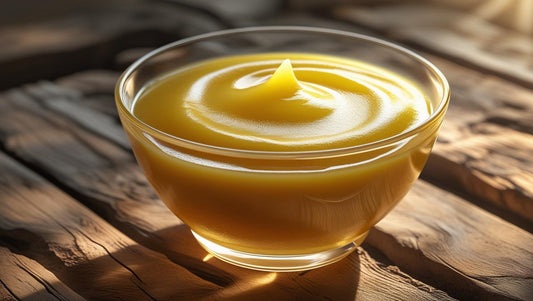Desi ghee is more than just a cooking fat—it’s a cultural staple in South Asian households, a trending health food among wellness lovers, and a subject of curiosity for many people who are discovering its benefits. In this blog post, we answer common questions and clear up myths about Desi ghee, from frying and storage to comparisons with other oils.
Which Brand Is Original Ghee?
In Canada, several reputable brands sell authentic ghee. Look for:
· Nanak
Which Ghee Is Better, Yellow or White?
The colour of Desi ghee—yellow or white—often sparks debate. Yellow ghee is typically made from cow’s milk, while white ghee usually comes from buffalo milk. Both have distinct tastes, fat content, and nutritional value.
· Yellow ghee is considered lighter, easier to digest, and rich in beta-carotene, making it a preferred choice for daily cooking and Ayurveda followers.
· White ghee has a higher fat content and a richer, creamier texture, making it ideal for sweets or deep-frying.
So, which ghee is better? If you want health and flavour in balance, yellow cow ghee wins for daily use.
Why Do Celebs Eat Ghee?
Celebrities from Bollywood to Hollywood have openly embraced ghee for its skin, digestion, and energy-boosting benefits. It’s a natural source of healthy fats, vitamins A, D, E, and K, and helps support metabolism.
Ghee is also used in intermittent fasting or keto diets. It keeps you full longer and fuels brain function, which is why celebs swear by it for weight management and mental clarity.
Is Ghee Healthier Than Olive Oil?
Comparing ghee with olive oil isn’t straightforward, as both serve different purposes.
· Olive oil is best for cold dishes or light sautéing.
· Desi ghee, with a high smoke point (~250°C), is perfect for frying and cooking at high temperatures without breaking down into harmful compounds.
While olive oil has monounsaturated fats, ghee contains CLA (conjugated linoleic acid) and butyrate, beneficial for gut health. For high-heat cooking, ghee is a better option.
Is It Better to Fry With Ghee or Butter?
Butter burns quickly because of its milk solids and water content. Ghee, which is clarified butter, has those removed—giving it a higher smoke point and longer shelf life.
So, frying with ghee is not only better than butter, it’s also safer and tastier. Plus, it adds a rich, nutty aroma to your dishes.
Can You Use Ghee on Toast?
Absolutely! Ghee melts beautifully and spreads easily—just like butter. You can use it on toast, rotis, or even pancakes. It adds a caramel-like flavour and makes breakfast a bit more indulgent. For an extra boost, sprinkle some cinnamon or jaggery on top.
Is Coconut Oil Better Than Ghee?
Coconut oil has its own health benefits, including MCTs (medium-chain triglycerides) and antimicrobial properties. However:
· Ghee is more versatile in cooking.
· Ghee has a more neutral flavour than coconut oil.
· Ghee is better tolerated by people sensitive to coconut taste or smell.
So, while both are healthy fats, ghee edges out in terms of culinary use and richness.
Is Frying in Desi Ghee Healthy?
Yes! Because of its high smoke point, Desi ghee doesn’t break down into toxic compounds during frying. It’s loaded with fat-soluble vitamins and antioxidants, making it a better alternative than most vegetable oils.
Yes, you should fry in desi ghee! You can deep-fry pakoras, samosas, fish, or meat in ghee for a golden, crispy texture without any weird aftertaste. Your kitchen will smell better too.
What Happens When Ghee Is Heated?
When heated, ghee remains stable due to its low moisture and absence of milk solids. It melts fast and develops a nutty, roasted aroma—ideal for tempering spices or cooking curry bases.
How to Remove Bad Smell from Ghee?
If ghee smells sour or off, it might be spoiled or overcooked. Here’s what you can do:
· Add a few curry leaves or cloves and heat gently to neutralize the smell.
· Store ghee in airtight containers away from moisture to prevent it from going bad.
What Is the Smell of Ghee?
Pure ghee smells nutty, warm, and slightly sweet. If it smells sour, metallic, or burnt, it may be spoiled or improperly stored.
Why Don’t People Like Ghee?
Some people dislike ghee due to:
· Its strong aroma
· Misconceptions about fat content
· Association with heavy Desi meals
However, when used properly, it can be light, aromatic, and full of flavour.
Should I Refrigerate Ghee After Opening?
No need! Ghee is shelf-stable. Just store it in a cool, dark place in a sealed jar. If refrigerated, it can harden but won’t spoil.
What Is a Good Substitute for Ghee?
If you're out of ghee, try:
· Coconut oil
· Clarified butter
· Avocado oil (for high-heat cooking)
However, flavour and aroma won’t match the richness of Desi ghee.
Why Is Some Ghee Cheap?
Cheap ghee is often adulterated or mixed with vegetable oils. Always check the ingredient list. Pure ghee is made from milk fat only. The cheaper it is, the more likely it is not 100% ghee.
Can Fungus Grow in Ghee?
Fungus can’t grow in pure ghee because of the absence of water. However, if ghee is contaminated with moisture or dirty spoons, mould or fungus can appear on the surface.
Why Did My Ghee Turn Black?
Black ghee usually means it was overheated or burned. This can happen if you fry on very high heat or leave it on the stove too long. Burnt ghee is not recommended for use.
Why Does Ghee Taste Bitter?
Bitter ghee can result from:
· Burning during cooking
· Spoiled milk/butter
· Overheating
Always store it properly and cook at medium heat.
What Not to Mix with Ghee?
Avoid mixing ghee with:
· Honey in equal quantities (as per Ayurveda, it’s considered toxic when equal)
· Water—moisture shortens its shelf life
· Strong-smelling ingredients that may overpower ghee’s delicate aroma
SHOP NOW


